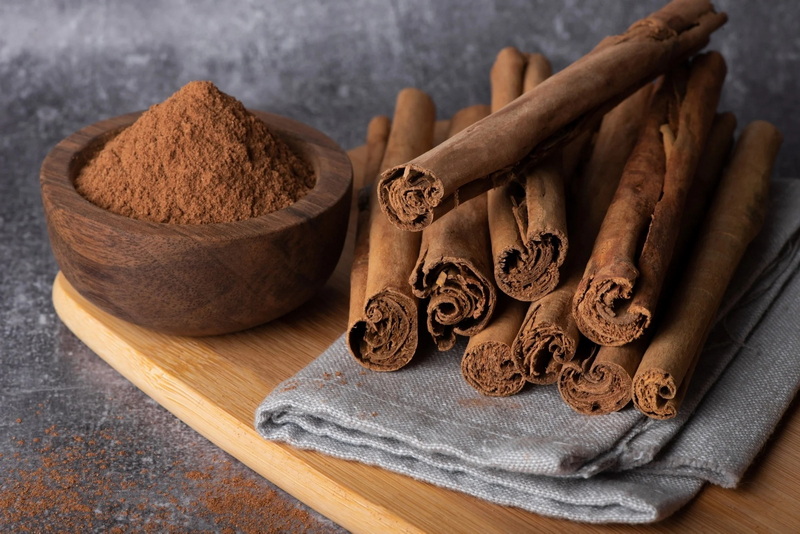Content Menu
● Introduction to Cinnamon Bark Extract
>> Antioxidant and Anti-Inflammatory Properties
>> Antimicrobial Effects
● Cinnamon Bark Extract and Diabetes Management
>> Improving Glycemic Indices
>> Enhancing Insulin Sensitivity
● Clinical Trials and Studies
>> Randomized Controlled Trials
>>> Summary of Clinical Trials
● Mechanisms of Action
● Safety and Side Effects
>> Interactions with Medications
● Comparison with Other Natural Remedies
>> Berberine vs. Cinnamon
● Future Directions
>> Potential for Combination Therapy
● Conclusion
● FAQs
>> 1. What is the recommended dosage of cinnamon bark extract for diabetes management?
>> 2. Can cinnamon bark extract be used by individuals with pre-diabetes?
>> 3. Are there any side effects associated with cinnamon bark extract?
>> 4. How does cinnamon bark extract compare to other natural remedies for diabetes?
>> 5. Can cinnamon bark extract be used in conjunction with conventional diabetes medications?
● Citations:
Cinnamon, a spice commonly used in cooking, has been studied for its potential health benefits, particularly in managing diabetes and insulin resistance. The focus of this article is on cinnamon bark extract, which is derived from the bark of the cinnamon tree, primarily Cinnamomum verum or Cinnamomum cassia. We will explore the scientific evidence supporting the use of cinnamon bark extract in improving glycemic control and enhancing insulin sensitivity.

Introduction to Cinnamon Bark Extract
Cinnamon bark extract is rich in bioactive compounds such as cinnamaldehyde, which is believed to be responsible for many of its health benefits. These compounds have been shown to possess antioxidant, anti-inflammatory, and antimicrobial properties, making cinnamon a valuable ingredient in both culinary and medicinal contexts.
Antioxidant and Anti-Inflammatory Properties
Cinnamon bark extracts have been demonstrated to retain their antioxidant and anti-inflammatory properties even after digestion, suggesting that they could be effective when consumed as part of a diet or as supplements. This stability is crucial for maintaining their bioactivity in the body.
Antimicrobial Effects
In addition to its metabolic benefits, cinnamon bark extract has shown antimicrobial activity against various pathogens, including bacteria and fungi. This property could be beneficial in preventing infections, particularly in individuals with compromised immune systems due to diabetes.
Cinnamon Bark Extract and Diabetes Management
Several studies have investigated the efficacy of cinnamon bark extract in managing diabetes. The evidence suggests that it can improve glycemic indices, enhance insulin sensitivity, and reduce blood glucose levels.
Improving Glycemic Indices
Cinnamon supplementation has been shown to improve fasting plasma glucose (FPG), hemoglobin A1c (HbA1c), and insulin resistance in patients with type 2 diabetes. These improvements are crucial for managing diabetes effectively and preventing complications.
Enhancing Insulin Sensitivity
Cinnamon extracts have been found to increase insulin sensitivity by upregulating the expression of GLUT4 receptors in skeletal muscle cells. This action helps cells absorb glucose more efficiently, reducing blood glucose levels and improving insulin function.
Clinical Trials and Studies
Numerous clinical trials have evaluated the effects of cinnamon bark extract on diabetes management. These studies often involve comparing cinnamon extract with a placebo in patients with type 2 diabetes or pre-diabetes.
Randomized Controlled Trials
A randomized, double-blind, multicenter trial aimed to assess whether water-soluble cinnamon extract could prevent the progression from pre-diabetes to diabetes. While the trial focused on pre-diabetic individuals, it highlights the potential of cinnamon in early intervention strategies.
Summary of Clinical Trials
| Year | Extract Type | Dosage | Duration | Outcome |
| 2010 | Cinnulin PF | 1 g/day | 8 weeks | Reduced fasting glucose and insulin resistance |
| 2015 | CinSulin | 250 mg/capsule, twice daily | 2 months | Decreased fasting glucose and cholesterol |
| 2018 | Cinnamon bark powder | 500 mg/capsule, twice daily | 3 months | Improved glycemic indices and lipid profiles |

Mechanisms of Action
Cinnamon bark extract acts through several mechanisms to improve insulin sensitivity and glucose metabolism:
1. Enhancing Insulin Signaling: Cinnamon compounds can activate insulin receptors, facilitating glucose uptake in cells.
2. Modulating Inflammation: Chronic inflammation is a key factor in insulin resistance; cinnamon's anti-inflammatory properties help mitigate this condition.
3. Antioxidant Activity: By reducing oxidative stress, cinnamon bark extract protects pancreatic beta cells and improves insulin secretion.
Safety and Side Effects
While cinnamon bark extract is generally considered safe, high doses may cause gastrointestinal side effects such as nausea or diarrhea. It is crucial to monitor blood sugar levels closely when using cinnamon alongside other diabetes medications to avoid hypoglycemia.
Interactions with Medications
Cinnamon may interact with certain medications, including blood thinners and diabetes drugs. Therefore, it is important to consult with a healthcare provider before starting cinnamon supplementation.
Comparison with Other Natural Remedies
Cinnamon bark extract is one of several natural remedies studied for diabetes management. Other options include berberine, turmeric, and ginseng. Each of these compounds has its own set of benefits and potential drawbacks.
Berberine vs. Cinnamon
Berberine, a compound found in plants like goldenseal and barberry, has been shown to have potent glucose-lowering effects. While both berberine and cinnamon improve insulin sensitivity, berberine may have a more pronounced effect on reducing blood glucose levels.
Future Directions
Future research should focus on optimizing the dosage and duration of cinnamon bark extract supplementation for diabetes management. Additionally, studies comparing cinnamon with other natural remedies could provide valuable insights into its relative efficacy.
Potential for Combination Therapy
Combining cinnamon bark extract with other natural compounds or conventional medications may offer enhanced benefits in managing diabetes. This approach could lead to more effective and personalized treatment strategies.
Conclusion
Cinnamon bark extract shows promise in managing diabetes and insulin resistance due to its ability to improve glycemic indices, enhance insulin sensitivity, and reduce blood glucose levels. While more research is needed to fully understand its effects and optimal dosing, existing evidence supports its potential as a complementary therapy for diabetes management.

FAQs
1. What is the recommended dosage of cinnamon bark extract for diabetes management?
The recommended dosage varies across studies, but common dosages range from 250 mg to 1 g per day of cinnamon extract. It is essential to consult with a healthcare provider before starting any supplement regimen.
2. Can cinnamon bark extract be used by individuals with pre-diabetes?
Yes, cinnamon bark extract may be beneficial for individuals with pre-diabetes by potentially preventing the progression to type 2 diabetes. However, more research is needed to confirm its effectiveness in this population.
3. Are there any side effects associated with cinnamon bark extract?
Generally, cinnamon bark extract is well-tolerated, but high doses may cause gastrointestinal side effects. It is crucial to monitor blood sugar levels closely when using cinnamon alongside other diabetes medications.
4. How does cinnamon bark extract compare to other natural remedies for diabetes?
Cinnamon bark extract is one of several natural remedies studied for diabetes management. Its effectiveness may vary compared to other options like berberine or turmeric, and individual responses can differ.
5. Can cinnamon bark extract be used in conjunction with conventional diabetes medications?
Yes, cinnamon bark extract can be used alongside conventional medications, but it is important to consult with a healthcare provider to ensure safe and effective management of diabetes.
Citations:
[1] https://pubmed.ncbi.nlm.nih.gov/29605574/
[2] https://pmc.ncbi.nlm.nih.gov/articles/PMC9914695/
[3] https://pmc.ncbi.nlm.nih.gov/articles/PMC4702386/
[4] https://pmc.ncbi.nlm.nih.gov/articles/PMC2901047/
[5] https://papers.ssrn.com/sol3/papers.cfm?abstract_id=4450001
[6] https://pmc.ncbi.nlm.nih.gov/articles/PMC5067830/
[7] http://journals.sagepub.com/doi/10.1177/15593258231200527
[8] https://pmc.ncbi.nlm.nih.gov/articles/PMC4003790/






























